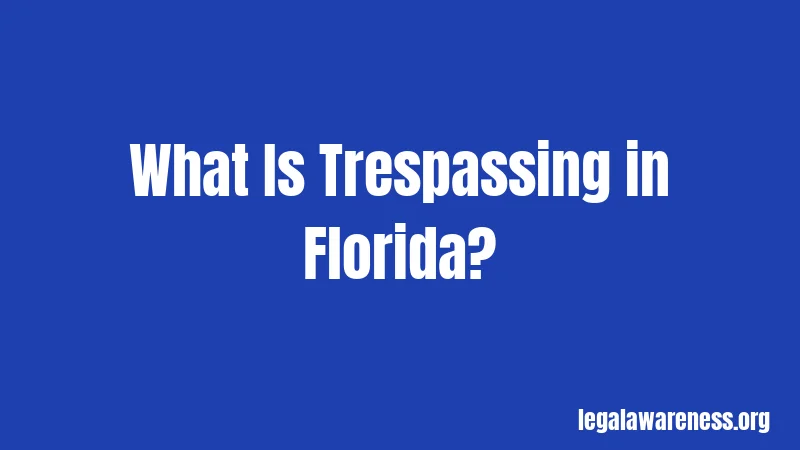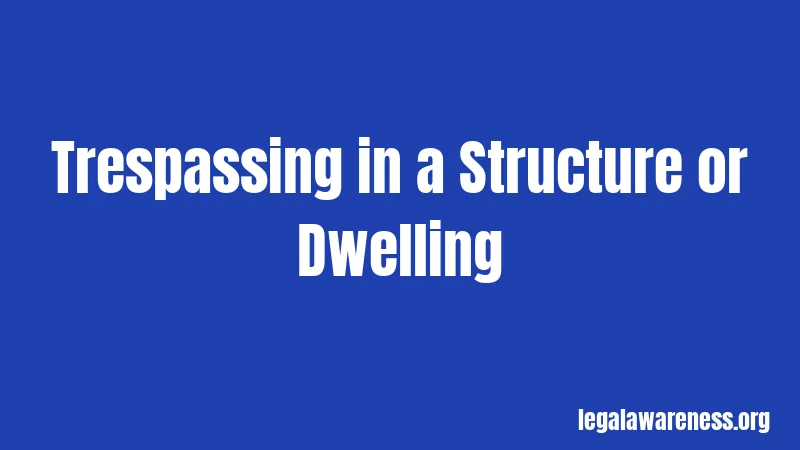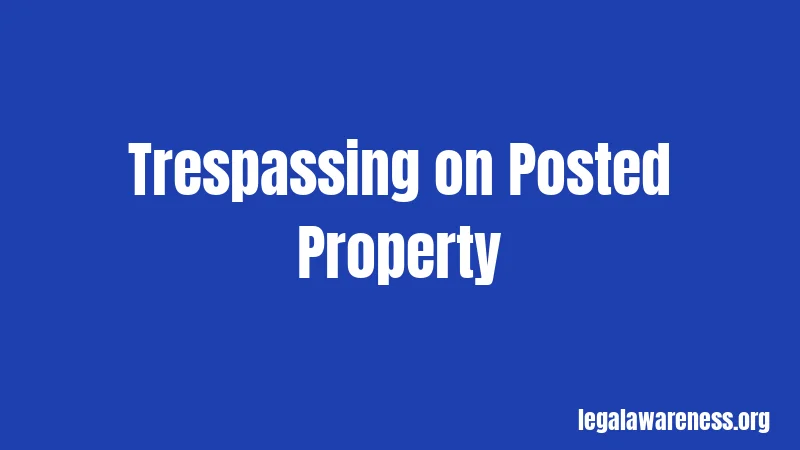Florida Trespassing Laws (2026): What Actually Counts as a Crime
Most people think trespassing is no big deal. Just walk on someone else’s property, get told to leave, and that’s that, right? Wrong. In Florida, trespassing laws are way stricter than most people realize. And the consequences? They can seriously mess up your future.
Here’s the truth: Florida treats trespassing seriously. You could face fines, jail time, or a criminal record. This applies whether you’re wandering into someone’s backyard or stepping into a business after closing. Let’s break down exactly what’s illegal and what happens if you get caught.
What Is Trespassing in Florida?

Okay, let’s start simple. Trespassing means going on someone else’s property without permission. Sounds straightforward, right? Here’s where it gets interesting: Florida has multiple types of trespassing, and they’re not all the same crime.
Think of it like a traffic ticket versus a DUI. One is way more serious than the other. Same idea with trespassing. The specific charge depends on what you did and where you did it.
Basic Property Trespassing
So what’s the most common trespassing charge? Walking on someone’s land without permission. In Florida, this is called “trespassing on property.” You could walk into someone’s yard, their driveway, or their vacant land. If you don’t have permission and you’re not supposed to be there, you’re trespassing.
Here’s the key part: the property owner needs to make it clear you’re not welcome. This usually means a fence, a sign, or they’ve told you directly to stay out. Notice those “No Trespassing” signs on rural property? That’s the owner making it official.
You’re not alone on this one. Most people don’t realize how broad trespassing laws are. You could honestly think a shortcut across someone’s land is fine. Turns out, it’s not.
Florida trespassing on property is a second-degree misdemeanor. That’s the base charge. What does that mean for you? We’ll get into penalties in a second, but basically, it’s more serious than a parking ticket.
Trespassing in a Structure or Dwelling

Now here’s where things get serious. Walking on someone’s land is one thing. Breaking into a building? That’s a whole different level.
If you enter someone’s house, apartment, or building without permission, that’s trespassing in a structure. This applies even if you didn’t break in. Maybe a door was unlocked, or someone left a window open. Doesn’t matter. If you went in without permission, you’re guilty.
Wait, it gets better. Trespassing in someone’s dwelling (their home) is a first-degree misdemeanor. That’s more serious than trespassing on property. See the difference? Your location changes the crime level.
Dwelling trespassing can actually carry jail time. We’re not talking about a warning here. You could genuinely go to jail for entering someone’s home without permission.
Wondering if this applies if you’re invited inside? No, you’re fine. It’s only illegal if you don’t have permission or you’re told to leave and you refuse.
Trespassing After Being Warned
Here’s one that catches people off guard. In Florida, you can be trespassing even without entering property. How? By refusing to leave when the owner tells you to.
Basically, if someone tells you to get off their property and you don’t leave, you’re now trespassing. This applies to businesses too. A store manager can tell you to leave, and if you stay, that’s trespassing. This one’s important.
Personally, I think this law makes sense. People have a right to control who’s on their property. If they ask you to leave, leave.
The charge is still a second-degree misdemeanor in most cases. But here’s the problem: it’s so easy to accidentally break this law. Someone asks you to leave. You don’t realize they’re serious. Now you’ve got a crime on your record.
Trespassing on Posted Property

You’ve seen those signs, right? “No Trespassing.” “Private Property.” “Keep Out.” In Florida, these signs are legally meaningful.
If a property is clearly marked with “No Trespassing” signs, you cannot legally be on that property. Even if there’s no fence. Even if the owner isn’t around. The signs count as notice that you’re not welcome.
Here’s what you need to do: actually read and respect those signs. They exist for a reason. Ignore them, and you’ve broken the law.
You might be wondering, what about businesses? Don’t worry, same deal. If a store, office, or workplace has posted hours or “No Trespassing” signs, you cannot be there outside those times or areas.
Penalties for Basic Trespassing
Alright, let’s talk consequences. What actually happens if you get caught trespassing in Florida?
For regular trespassing on property, you’re looking at a second-degree misdemeanor. Here’s what that means: up to 60 days in jail and/or a fine up to $500. That’s not huge, but it’s not nothing either.
Plus, you get a criminal record. This matters way more than the fine. A trespassing conviction can show up on background checks. Employers see it. Landlords see it. That can affect jobs, housing, even school admissions.
Sound complicated? It’s actually not. The basic rule: don’t go on someone’s property without permission, and respect their “No Trespassing” signs.
Trespassing in a Dwelling: Serious Penalties
Now, trespassing in someone’s home is way worse. This is a first-degree misdemeanor.
You’re looking at up to one year in jail and/or a fine up to $1,000. That’s 60 days versus 365 days. That’s a huge jump. And the fine is double.
Plus, you still get a criminal record. A first-degree misdemeanor is more serious than a second-degree. If you ever need to explain this conviction, it looks a lot worse on job applications.
Here’s where it gets interesting: if you’re caught trespassing in a dwelling at night, prosecutors might charge you with something even worse. The charge could be burglary, not just trespassing. That’s a felony.
Wait, really? Yes, really. Entering someone’s home without permission, especially at night, looks a lot like burglary to the law. Even if you didn’t steal anything.
Trespassing After Warning: A Sneaky Charge
Remember how we talked about trespassing because someone told you to leave? The penalties are the same as regular trespassing.
Second-degree misdemeanor. Up to 60 days in jail. Up to $500 fine. Criminal record.
But here’s the tricky part: it’s way easier to accidentally commit this crime. You’re at a store. A manager asks you to leave. You don’t think it’s a big deal. You stay for five more minutes.
Boom. Trespassing after warning.
This one’s probably the most important rule. If someone tells you to leave, leave. Don’t argue. Don’t stay “just a little longer.” Just go.
Defenses Against Trespassing Charges
Okay, so you’ve been charged with trespassing. Are you automatically guilty? No, actually. There are legitimate defenses.
The main defense is that you had permission. If you can prove the owner gave you permission to be there, the charge should be dropped. This could be a text, an email, or a witness.
Another defense is that you didn’t actually know you were trespassing. For example, maybe the property line wasn’t marked. Maybe you thought you had permission. These can be valid defenses, but proving them is tricky.
A third defense is that the sign or notice wasn’t proper. If a “No Trespassing” sign was too small, too faded, or in a weird location, you might argue you didn’t see it. Again, this is tough to prove.
Honestly, prevention is easier than defense. Just stay off property you’re not sure about. If you’re not 100 percent sure you have permission, don’t go there.
Special Circumstances: When Trespassing Gets More Serious
There are situations that make trespassing charges worse. Let’s talk about a few.
Trespassing on educational property is especially serious. Schools, colleges, and universities don’t mess around. Trespassing there can result in stricter charges.
Trespassing at a critical infrastructure facility is also way more serious. Think power plants, water treatment facilities, or transportation hubs. The government takes those very seriously.
If you’re trespassing while armed (carrying a gun, knife, or weapon), the charge gets more severe. You’re now looking at a more serious felony, not just a misdemeanor.
And here’s one that surprises people: if you trespass and damage property or commit another crime while trespassing, you can be charged with both crimes. So you get a trespassing charge plus vandalism, theft, or worse.
Recent Changes to Florida Trespassing Laws
Have the laws changed recently? Kind of, but not dramatically. Florida’s trespassing statutes (Florida Statute 810.08 and 810.09) have been stable for a while. However, how they’re enforced has gotten stricter in recent years.
One change worth noting: Florida has been clearer about “castle doctrine” protections. This means homeowners have the right to use force, including deadly force, to remove trespassers. That’s been emphasized more in recent years.
Basically: if you trespass on someone’s home and they feel threatened, they can legally use force to remove you. Don’t be that person.
How to Avoid Trespassing Charges
Here’s the practical part. How do you stay safe? It’s pretty simple, actually.
First, always get permission before going on someone else’s property. Even if it looks like nobody’s around, even if the property looks abandoned. Get permission or don’t go there.
Second, respect “No Trespassing” signs and fences. These are legally meaningful. Ignore them, and you’ve broken the law.
Third, if someone tells you to leave, leave immediately. Don’t argue. Don’t explain. Don’t stay “just a minute.” Leave.
Fourth, if you’re renting property, make sure you understand your rights. Your landlord might have the legal right to enter sometimes. You don’t have the right to refuse all entry.
Fifth, be extra careful with abandoned or vacant properties. They look like nobody cares. But someone owns them, and you don’t have the right to be there.
Trespassing at Businesses and Workplaces
Here’s a practical situation you might actually face. You’re at a store, restaurant, or business. Can they kick you out?
Actually, yes. Business owners can ask you to leave anytime. If you refuse, you’re trespassing. Period.
This applies even if you’re a paying customer. Technically, stores reserve the right to refuse service. Once you’re asked to leave, you need to leave. If you don’t, it’s a crime.
This surprises people sometimes. But think about it: would you want someone in your store or business who refuses to leave? Of course not.
The good news? Businesses rarely press charges for simple refusal to leave. Usually, they just want you gone. But they have the legal right to call police and have you arrested.
So what should you do? Respect their decision. If a business tells you to leave, leave without making a scene. It’s not worth a criminal record.
Frequently Asked Questions
Does trespassing show up on a background check? Yes. Any conviction, even a misdemeanor, shows up on criminal background checks. Employers, landlords, and schools will see it. This can affect jobs, housing, and education.
Can I trespass accidentally? Absolutely. You could genuinely not realize you’re on someone’s private property. But lack of knowledge isn’t always a valid defense. Always make sure you have permission before entering property.
What if the property isn’t marked with signs? Unmarked property is still someone’s property. Just because there’s no fence or sign doesn’t mean you can go there. If you’re not sure, don’t go.
Can police arrest me for trespassing? Yes. Trespassing is a criminal charge. Police can arrest you and take you to jail. You’ll be booked and might have to post bail.
What if I’m homeless and need shelter? This is genuinely difficult. Homeless people sometimes need to find shelter anywhere they can. However, legally, you still need permission to be on someone’s property. If you’re homeless, seek help from shelters, churches, or community organizations instead.
Can I be charged if I didn’t know it was private property? This depends on the situation. If the property is clearly marked as private and you still enter, your ignorance isn’t a good defense. If the property is unmarked and you reasonably thought it was public, you might have a defense. It’s complicated.
What’s the difference between trespassing and breaking and entering? Trespassing is entering property without permission. Breaking and entering means forcing your way in or damaging something to get in. Breaking and entering is a felony, and trespassing is a misdemeanor. Breaking and entering is more serious.
If I’m invited by one roommate, can the other roommate have me arrested for trespassing? This is tricky. If the roommate who invited you has a legal right to have guests, then no. If they don’t have that right, the other roommate could technically have you arrested. It depends on the lease and who has the legal right to the space.
Final Thoughts
Now you know the basics of Florida trespassing laws. They’re stricter than most people think, and the consequences are more serious than you might expect.
Here’s the bottom line: respect private property. Get permission before entering someone else’s land or building. Respect “No Trespassing” signs. If someone tells you to leave, leave.
Stay informed, stay safe, and when in doubt, ask for permission. It takes two seconds and could save you from a criminal conviction.
References
Florida Statute 810.08: Trespassing on Property
Florida Statute 810.09: Trespassing in a Structure or Dwelling
Florida Senate Legislative Information
